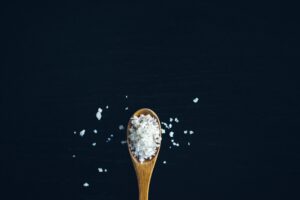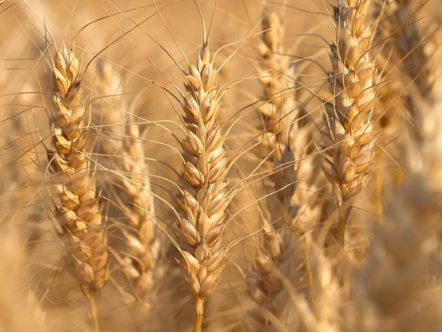You are the salt of the earth. But if the salt loses its saltiness, how can it be made salty again? It is no longer good for anything, except to be thrown out and trampled underfoot. You are the light of the world. A town built on a hill cannot be hidden. Neither do people light a lamp and put it under a bowl. Instead they put it on its stand, and it gives light to everyone in the house. In the same way, let your light shine before others, that they may see your good deeds and glorify your Father in heaven. Matthew 5:13-16 NIV
 Jesus tells us in this passage that we are called to be SALT and LIGHT for the GLORY OF GOD.
Jesus tells us in this passage that we are called to be SALT and LIGHT for the GLORY OF GOD.
He is using salt and light, in this instance, as metaphors for the gospel. Believers should be the embodiment of the gospel. Our lives should preach as good a sermon as our mouths – and honestly, I feel convicted even typing that sentence. When people see me, does anybody see the gospel?
As a kid, I understood the idea of being like LIGHT, that made sense to me. But I remember thinking it was SO weird that Jesus would tell us, His followers, to be like SALT. And even after lessons on the subject, frankly I was still largely lost. And I still thought it was an odd illustration. Salt, Lord? You want me to be SALT?!
Salt is very versatile. It was kind of an ancient Swiss Army Knife. It served several different purposes. Most of you probably know that salt is not only a seasoning, but it is a natural preservative. In the ancient world they didn’t have all the chemicals and methods that we have now to preserve everything from food to paint to cosmetics (and they were arguably better off for it in the long run). They used salt to preserve both meat and vegetables. Salt was a big part of their lives and their diets.
Salt was immensely important and is even considered a founding contributor to the development of civilization because it helped eliminate the dependence on the seasonal availability of food. Salt made it possible to transport food over long distances without spoilage. Salt is physically necessary for our survival, and for the survival of other animals as well. It was so valuable that it was used in trade and as currency. Cities like Rome were purposely built near saltworks (where salt was harvested).
on the seasonal availability of food. Salt made it possible to transport food over long distances without spoilage. Salt is physically necessary for our survival, and for the survival of other animals as well. It was so valuable that it was used in trade and as currency. Cities like Rome were purposely built near saltworks (where salt was harvested).
All that to say, in Jesus’ day SALT WAS IMPORTANT.
So back to the original question, why on earth would Jesus compare us to SALT?
Salt seasons things. It makes things that may be otherwise unpalatable, hard to swallow, or just taste bad, easier to take in. When we are talking to those around us about the Christian walk, sin, grace and the blood sacrifice that Jesus paid for our sin – it can be hard to accept. Especially when it is presented in a harsh manner. But we are called to do all things in LOVE (1 Corinthians 16:14). So while we don’t want to sugar coat the gospel or water it down to appear less important or less urgent, we DO want to season it a little. The gospel needs to be shared from a spirit of genuine love and concern. Folks know when you are sincere.
Let your conversation be always full of grace, seasoned with salt, so that you may know how to answer everyone. Colossians 4:6 NIV

Salt is a preservative. It keeps flesh from rotting or decaying. That goes for us (Matthew 5:13 indicates that we should stay salty) as well as those around us with whom we are sharing. When we live “salt” (the gospel) it keeps our flesh from rotting – because sin equals death, rot and decay. And human nature is a sinful nature. Following Jesus preserves us and keeps us from the rot that results from sin, not just in this life, but eternally.
Salt can be used to promote healing. Anybody who has ever had a cut, and then taken a dip in the ocean knows that salt can help wounds heal more quickly. They also know, many times it can initially hurt like the dickens! A mixture of salt and honey was used in ancient times by the Greeks for topical wound care. And because salt inhibits the growth of bacteria, saltwater can also be used to irrigate a wound. Spiritually, a generous understanding and application of the gospel can promote healing to our wounded hearts and spirits.
 Salt makes you thirsty. Y’all there is a REASON McDonald’s sells a coke the size of your head with that combo burger and good old salty fries. A taste of salt makes us want to drink. In the same way that salting our food makes us thirsty, when we are salt of the earth, we should leave the folks around us craving the Word. They should be thirsty for the LIVING WATER. And as Christians, we should be happy to lead dry, parched people to the fountain.
Salt makes you thirsty. Y’all there is a REASON McDonald’s sells a coke the size of your head with that combo burger and good old salty fries. A taste of salt makes us want to drink. In the same way that salting our food makes us thirsty, when we are salt of the earth, we should leave the folks around us craving the Word. They should be thirsty for the LIVING WATER. And as Christians, we should be happy to lead dry, parched people to the fountain.
Salt can keep things from growing. As a gardener, I know that a good way to naturally get rid of weeds and plants that are trying to invade my yard or garden, is to use salt on them. If done correctly, it will kill the weed and not harm the surrounding plants. The same thing happens spiritually. If you have something coming up in the garden of your life that is undesirable, it is a good idea to dump the gospel on it! The Word is our sword, and we wield our sword in our mouths. Having a liberal dose of the gospel in our lives should make it exceedingly difficult for anything that is NOT of God to grow. Left unchecked, these weeds (or tares as they are referred to in Matthew 13:24-30) will grow and eventually begin to take over and choke out the good, fruit bearing things planted in our lives.

When we work and toil, we lose salt. When we are really hard at work, we sweat. We lose salt through our sweat. If that salt is not replenished, it throws off the balance of electrolytes in the body. That can cause all kind of issues from dizziness and not being able to stand up and balance, to heart rhythm problems and more. Spiritually speaking, when we are working in the kingdom, spreading the gospel and serving, we tend to lose salt too. That’s why it’s important that we remember to stop and take it in. We must replenish our supply. If we don’t, we might lose the ability to stand and be easily knocked off balance. It could cause problems with our hearts if we are constantly working, but not taking salt in to replenish what we have lost.
Salt was an important part of ancient life. There are scriptures referring to salt all throughout the Word. There is even a perpetual salt covenant that God made with the Davidic kings (kings from David’s bloodline). But if we look at salt in terms of the gospel, it’s easy to see why Jesus would use it as an illustration. Just as the gospel should touch every area of our lives, salt was pervasive in the lives of the people at that time. So share the salt, sprinkle it everywhere! Use it for everything! Share the gospel with the people around you! You are called to BE SALTY!!
Please feel free to share our posts and our blog site, and leave comments below! We are so glad you are here!

Wow…such correlation between the two saltys. This is a good explanation to the world what it means to be salty.
Thank you!